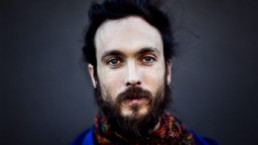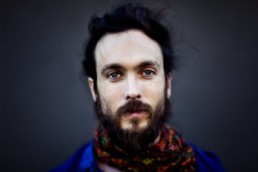Composer Alex Ebert on ‘A Most Violent Year’
"I had this 70's beat machine and just laid that down and then I just started free-styling; without writing lyrics down I just started to record. So [the finished song] was basically the first pass."
He is best known for being the lead singer of the band Edward Sharpe and the Magnetic Zeros, and Alex Ebert proves his creativity knows no bounds as he brings the dreamy folk-scape composition to the big screen in A Most Violent Year. This is Ebert’s second collaboration with director J.C. Chandor, as he previously composed the score for last year’s All Is Lost starring Robert Redford, creating one of the most beautiful ending credit songs, “Amen“. Here, Ebert talks to an intimate audience during a special screening and Q&A of Year, and talks about his free-jazz inspiration, working with Chandor, and the process of writing the film’s only lyrical song (and one I can’t stop playing), “America For Me.” He begins:
SO, FILM NUMBER TWO WITH J.C.- THIS TIME AROUND, WAS IT AN EASIER PROCESS?
Well, I knew that I would have a long leash, maybe too long in this instance- I threw a little too much spaggetti on the wall. At first after reading the script, I thought this could be a free jazz score, and so I threw a lot of that at J.C. At first I overdid it, intentionally. I tried everything straight jazz. Some of it did stay, there are still a lot of horns in the score, but yeah it is a reductive process. You don’t always just hit the mark and walk away. I wish, but no.
DID YOU LEARN ANYTHING FROM WORKING ON ALL IS LOST THAT HELPED YOU HERE?
I did learn so much from All is Lost, just the idea that music can end when it wants to, is entirely of service as opposed to pop music being a service to you. It is the same predicament as All Is Lost in A Most Violent Year, in a sense- “What does this scene want,” “What does this character want.”
To me, this is a character study- this is about Abel and his singular, meditative, capitalist trance and as J.C. pointed out to me, the entire movie his eyes are half closed. He is extremely focused, almost sort of sleepwalking, towards his aim. Eventually I realized the strongest thing to do is to try to bring everyone into that atmosphere with him.
For our review of A Most Violent Year, click here.
THERE IS A CUE EARLY ON IN THE FILM THAT SORT OF SUGGESTS THIS “DOOM” LIKE SOMETHING BAD IS ABOUT TO HAPPEN, BUT THEN THIS BASS FLUTE COMES IN LIKE A SENSE OF ASPIRATION.
Abel is a doomful figure to me, and I think the end of the movie translates that graphically. His ambition is like a double edge sword.
WAS THERE A PARTICULAR MELODY THAT WAS THE STARTING POINT?
Yes, Abel’s theme. I realized it after the fact, but it’s basically Dracula’s theme.
[Laughter]
YOU GET TO LET LOOSE DURING THE CHASE SCENE.
It was my first chase scene, I was a little nervous about that because I knew you need percussion… I didn’t go study any chase scenes I just started with the basics. I started playing it myself, and the first pass at recording just worked. I think I might’ve gotten a bit lucky with that.
WHAT TYPES OF INSTRUMENTS DID YOU BRING IN?
Percussive instruments like the piano I found to be a little intrusive, so it was more about things like the flute, the synth, bass. It was one of those movies you had to keep paring back, because it was a slow burn.
YOUR BAND, EDWARD SHARPE AND THE MAGNETIC ZEROS, WAS VERY ACTIVE IN THE LAST YEAR, RECORDING AND TOURING, HOW DID YOU FIND TIME FOR THIS?
You just make the time I guess, it’s exhausting for sure, but it’s rewarding. Especially when you do get that free reign, you have this canvas and you get asked to make music to imagery and I think the combination of music to imagery is very exciting, it’s very different than just writing music, it’s special. A lot of people are going to be in a dark room and witness this really profound combination of visual and auditory sound, and you get to contribute to part of that. With that carrot in front of my face, I just made the time somehow.
When I write or perform something that is really great, and to me I feel the same way about “Amen” and I don’t feel this way about most of my stuff, something happens that’s uncontrollable where I don’t feel like I did it.
IN ALL IS LOST, J.C. BROUGHT YOU ON TO DO THE SCORE AND YOU PROVIDED “AMEN,” THE WONDERFUL SONG THAT CLOSES THAT FILM, DID THEY WANT A SONG AT THE END OF THIS FILM TOO?
Similar to last time, they gave me a few nudges and winks, but nothing so direct. I didn’t think I was actually going to make a song for this. Originally, I wanted to make music that was reactive, a band called Suicide came to mind- a very early punk-synth operation from New York around 1978. I wasn’t really able to incorporate that into the score but at the end of the movie, then I felt like, ok, it’s time to bring in the noise. I had this 70’s beat machine and just laid that down and then I just started free-styling; sort of thinking about Julian’s character and without writing lyrics down I just started to record. So [the finished song] was basically the first pass.
DO YOU HAVE THE LUXARY OF LISTENING TO A PIECE OF MUSIC, FOR EXAMPLE, “AMEN,” AND BE ABLE TO STEP BACK AND RECOGNIZE THE BEAUTY OF THE MUSIC?
When I write or perform something that is really great, and to me I feel the same way about “Amen” and I don’t feel this way about most of my stuff, something happens that’s uncontrollable where I don’t feel like I did it. I’m in awe of it and I don’t know who did it and I’m amazed at how good it is. I’m in awe at the fact that I was apart of it, and that happened to me with “Amen” and when that happens it’s a pretty special feeling.
A Most Violent Year is in select cities now.
Morgan Rojas
Certified fresh. For disclosure purposes, Morgan currently runs PR at PRETTYBIRD and Ventureland.



